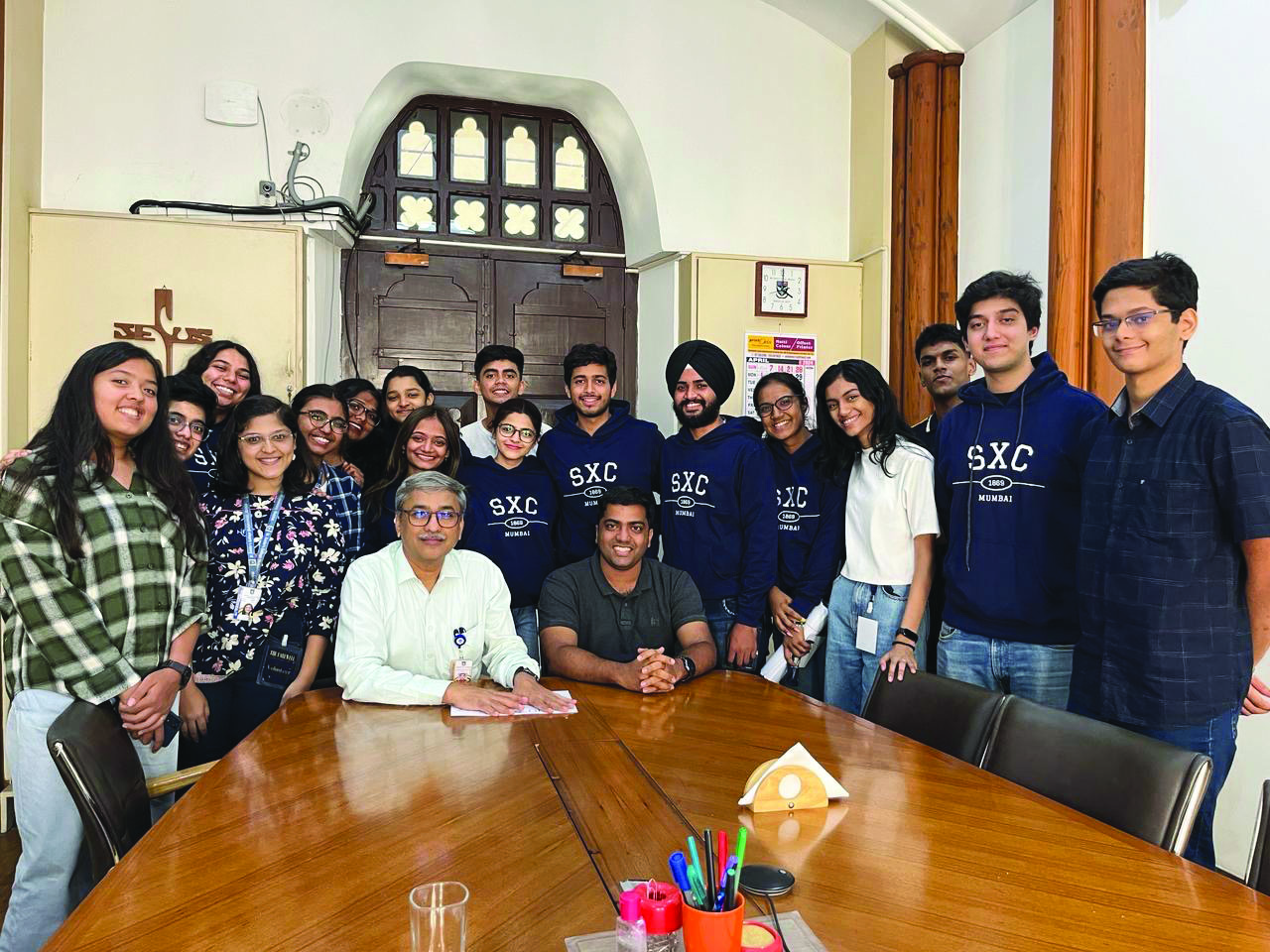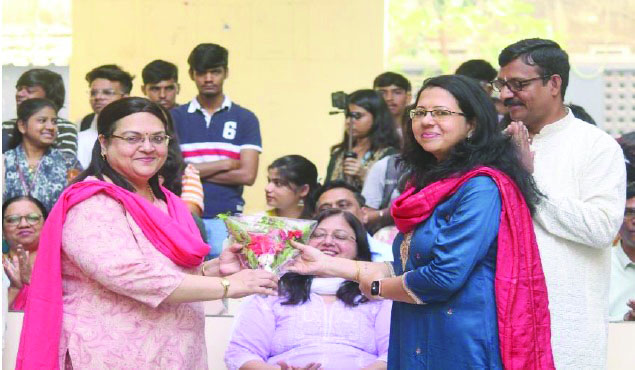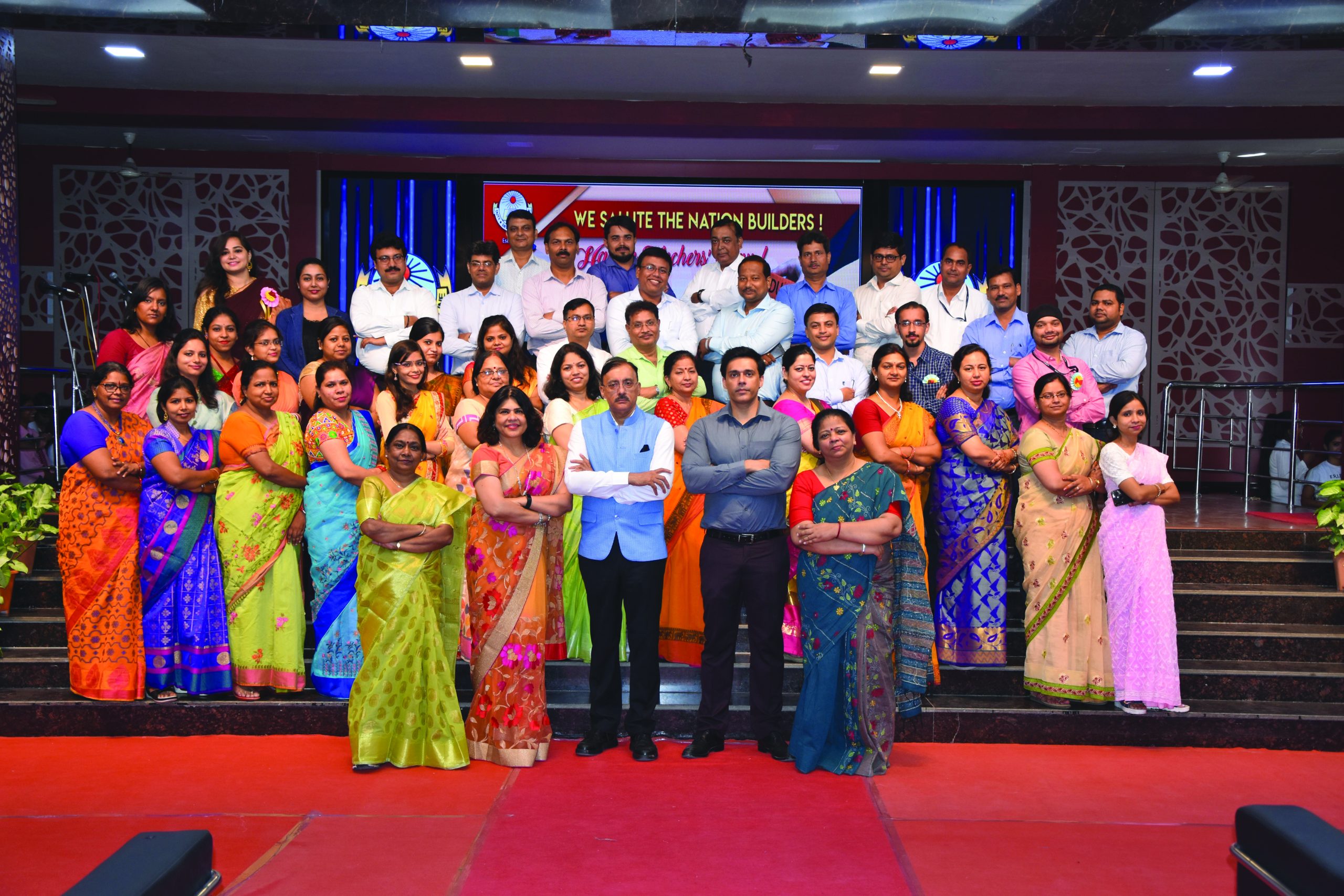Private colleges awarded autonomous status by UGC have a large number of academic and administrative freedoms denied to non-autonomous colleges which are tied to the apron strings of their affiliating university. Consequently their graduates tend to be a cut above.

SXM’s Dr. Rajendra Shinde (centre left): wings to soar
Within India’s complex higher education system, school-leavers aspiring for undergraduate Arts, Science and Commerce (ASC) education have a choice between private autonomous, government autonomous and government/private non-autonomous colleges.
The apex University Grants Commission (estb.1956), which regulates and coordinates higher education countrywide, has discretionary power to confer academic and administrative autonomy on higher education institutions (HEIs) awarded top A grading by the National Assessment & Accreditation Council of India (NAAC), and which in the commission’s opinion have an excellent track record of higher education delivery. Accordingly, only 1,222 colleges from a universe of 47,000 countrywide have been conferred autonomy by UGC.
Unlike non-autonomous colleges which are tied to the apron strings of their affiliating universities, autonomous colleges have the freedom to design their own syllabuses and curriculums, introduce new study programmes, conduct examinations and prescribe rules for admission in consonance with the reservation policy (for scheduled castes & tribes and OBCs) of the state government/national policy. Moreover, they can set tuition fees independently. They can also constitute their own academic councils, board of studies and finance committees, and have “complete administrative autonomy and the privilege of appointing their own administrative staff and teaching faculty including principal”. These are important freedoms and set graduates a cut above graduates of non-autonomous colleges.
However, it is noteworthy that the UGC does not always exercise its power to confer autonomous status rationally. For instance, while St. Xavier’s College, Mumbai was awarded autonomy in 2010, the top-ranked St. Stephen’s College, Delhi and several other Delhi colleges which have the required NAAC rating have not been conferred autonomy, and remain tied to the apron strings of Delhi University. It’s also noteworthy that in this year’s EW India Higher Education Rankings 2025-26, the total score awarded to the private non-autonomous St. Stephen’s is comfortably higher than to the private autonomous St. Xavier’s, Mumbai.
Given these complexities and contradictions within the country’s higher ed system, it’s not surprising that the National Education Policy (NEP) 2020 has recommended dismantling the existing higher education system which requires all colleges to be affiliated with a presiding university. It recommends evolution of colleges into autonomous multi-disciplinary degrees-awarding universities in their own right.
Meanwhile as this recommended evolution in a “phased manner” materializes, to enable school-leaving students to choose between private autonomous, government autonomous and non-autonomous undergrad colleges, they are ranked separately in our institutional ranking league tables.
Just as the rankings league table of non-autonomous colleges has been dominated by St. Stephen’s College, Delhi, for the past five years, the league table of private autonomous colleges has been dominated by St. Xavier’s College, Mumbai (SXM) for the past quinquennium. In 2025-26, the 2,100 knowledgeable respondents interviewed by the Bengaluru-based market research company AZ Research Partners Pvt. Ltd, have again voted SXM India’s #1 private autonomous college with best scores under all six parameters of higher education excellence including the critical parameters of faculty competence and curriculum and pedagogy.
Dr. Rajendra Shinde, the cheerful and accessible principal of SXM, is delighted this vintage college (estb.1869), which has 4,194 top-score school-leavers on its muster rolls, is ranked India’s #1 private autonomous college for the sixth consecutive year.
“Since I was appointed principal in 2018, it has been a privilege and a challenge to uphold and advance a legacy built over 156 years. Sustaining the India #1 position year after year is no small feat. Yet it’s a collective triumph. This honour should accrue to our talented faculty, supportive management, and vibrant, creative student community,” he says.
According to Shinde, SXM’s high scores under all six EW parameters are the “outcome of concerted effort”. “Since SXM was conferred autonomous status in 2010 — the first ASC college of Mumbai University to be granted autonomy — we made it our mission to design holistic and interdisciplinary curricula; introduced several skill-based programmes to enhance students employability, and made our Social Involvement Programme mandatory for every student to develop social sensitivity that is the essence of Jesuit education. More important, as an autonomous institution, we introduced a range of innovative postgraduate and diploma programmes in new disciplines such as public policy, big data analytics, astrophysics and bioinformatics. Simultaneously, we are implementing NEP 2020 to provide academic flexibility and multidisciplinary learning to our students. Autonomy gave us wings, and we’ve used them not just to fly, but to soar new pathways for higher education in the country. Next, the St. Xavier’s management is deliberating on the possibility of accelerating attainment of university status,” says Shinde, who after a brilliant 42-year innings at SXM including seven years as principal, is set to retire this month.
SXM’s dominance of top table apart, there’s been a major rearrangement of seating order. This year’s sample respondents have promoted Mount Carmel College (MCC), Bengaluru — which last June turned co-ed after being an all-women’s institution for 76 years — to #2 (#3 in 2024-25) and the #1 ASC college in the southern state of Karnataka.
MCC’s elevation has pushed the rival St. Joseph’s College (Autonomous), Bengaluru to #3 (#2). Narsee Monjee College of Commerce & Economics, Mumbai, also ranked #3 and Mithibai College, Mumbai at #4 have interchanged their 2024-25 ranks. St. Xavier’s College, Kolkata has lost ground and is ranked #5 (#4) jointly with the Nagindas Khandwala College, Malad (W), Mumbai, awarded a huge promotion from #8 in 2024-25.

Dr. Moushumi Datta (left): experiential & participative pedagogies
Dr. Moushumi Datta, principal of Nagindas Khandwala College (NKC), conferred autonomy in 2016, is “proud and grateful” to EW sample respondents for NKC’s promotion to top table.
“This promotion from #8 to #5 this year means a lot to us because it’s the outcome of the hard work of our students, faculty and staff to improve under all parameters. This promotion will inspire us to keep improving to offer the best undergrad ASC education to our students. I am especially pleased with our high scores under curriculum and pedagogy and placements. This is because during the past few years, we have focused on designing well-structured and contemporary curricula aligned with industry needs and corporate workplaces through introduction of experiential and participative pedagogies. Since NKC was conferred autonomous status in 2017, we have launched several industry-driven programmes including B.Sc in finance and analytics, artificial intelligence and machine learning, and signed international collaboration agreements with foreign universities including University of Fraser Valley, Canada and Rider University, USA. This year we are set to launch nine study programmes in new-age disciplines. Thanks to our autonomous status, NKC has the flexibility to innovate and respond quickly to changing industry trends,” says Datta. Currently, NKC has 6,835 students and 120 faculty on its muster rolls.
Unsurprisingly, eight of India’s most admired private autonomous colleges are sited in Mumbai, the country’s commercial capital. NKC is followed by the RA Podar College of Commerce & Economics, Mumbai, ranked #6 (#5) jointly with the BK Birla College of Arts, Science & Commerce, Kalyan (Mumbai), which has risen hugely in public esteem from #9 last year. Loyola College, Chennai is also ranked #6 (#4). The KJ Somaiya College of Arts and Commerce, Mumbai has lost ground and is ranked #7 (#5) as has St. Francis College for Women, Hyderabad, jointly ranked #8 (#6) with Madras Christian College, Chennai (#7). KPB Hinduja College of Commerce, Mumbai is #9 (#8) and Presidency College, Bengaluru is promoted to #10 (#11) jointly ranked with Stella Maris College, Chennai (#10).

Presidency, Bengaluru students. Inset: Suhael Ahmed
Suhael Ahmed, Vice-Chairman of Presidency College, Bengaluru, is “elated” by the college’s debut in the national Top 10 with high scores for faculty competence, curriculum and pedagogy and placement. “Though it’s encouraging to be ranked within the national Top 10 from among 1,200 private autonomous colleges countrywide, I am happy without being thrilled. Happy because it’s motivating to go up the ladder. Our scores for faculty competence, curriculum and pedagogy should have been better. We are one of the premier new age colleges offering high-quality faculty with proven domain expertise, best teaching resources, and innovative experiential pedagogies. After being granted autonomy in 2021, we have modernised our study programmes and pedagogies to be in sync with industry and job market demands. We are committed to continuous improvement and have set a target of transforming into a Deemed-to-be-University, in alignment to Section 3 of the UGC Act, over the next few years,” says Ahmed, also Chief Operating Officer of the Presidency Group of Institutions comprising eight schools, four colleges and a university with an aggregate 38,000 students.

Sunbeam College co-founders Deepak (centre) & Bharti Madhok (centre left)
It’s pertinent to note that although ranked modestly nationally, all autonomous colleges in the latest EW league table are national assets and highly ranked in their states, most of which are larger and more populous than European countries. For instance, Sunbeam College for Women, Bhagwanpur, Varanasi ranked #25 nationally is the #1 private autonomous college of Uttar Pradesh (pop.215 million), Khalsa College, Amritsar #43 in India is Punjab #1 and Sadhu Vaswani Autonomous College, Bairagarh, Bhopal #69 in India is Madhya Pradesh #1.























